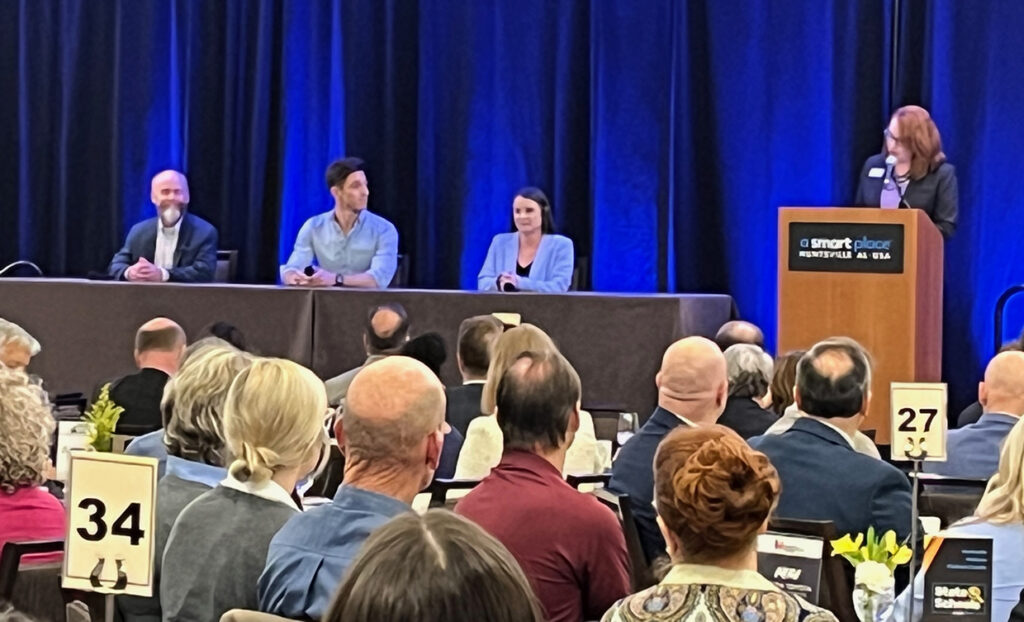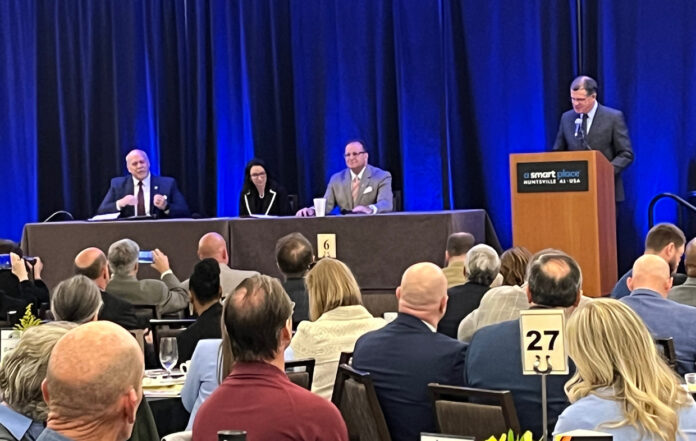HUNTSVILLE — The Huntsville/Madison County Chamber of Commerce’s annual State of the Schools breakfast address kicked off on a solemn note Wednesday morning calling for a moment of silence for fallen Huntsville Police Officer Garrett Crumby and his partner, Officer Albert Morin, who was critically injured in a deadly shooting Tuesday night, as well for the three students and three adults murdered Monday at The Covenant School in Nashville.
The sold-out audience consisted of local businesses, city and county elected leaders, as well as representatives from the Schools Foundation and Boards from all three school systems.
The teachers and superintendents discussed a wide range of school-related topics including school safety, coming out of the two-yearlong pandemic, and teaching challenges.
The annual gathering featured rotating panels consisting of a National Board-Certified teacher at the elementary, middle school and high school level. and school superintendents from Huntsville City, Madison City and Madison County schools.
They also showed a video of students representing each school system who will be taking advanced placement classes that will let them jump from a senior in high school to a sophomore in college when they graduate.
Connor Peyton from Grissom High School, representing the Huntsville City Schools, talked about taking mechanical engineering and advanced manufacturing classes; Briley Blomeley from James Clemons High School, representing Madison City Schools, talked about taking classes in environmental science, calculus and psychology; and Isaac Place from Madison County Schools talked about his interest in ROTC, a program not often thought to be eligible for AP.

Representing Madison City Schools, National Board Certified third-grade teacher Lauren Cecil said one of the challenges she faces as a teacher is the importance of making young children feel safe and loved before they are open to learning.
“Students come to us from many different backgrounds and a lot of times before we can teach them anything instructionally, we have to build relationships,” she said. “It takes a little bit of time and that can be a difficult balancing act in the elementary school world, especially since I teach all subjects. Getting together the content while ensuring every student feels safe and loved can be a challenge.
“We work on that every day but fortunately at our school, we have many resources to help us, lots of counseling programs and social programs that are wonderful.
“All those things build upon each other to really give kids that security the need so they can learn.”
Cody Carlton teaches theatre to middle school students and represented Madison County Schools. He said the biggest challenge he faces today is mental health.
“Not just here but across the country, mental health is a challenge,” he said. “I am sure as business leaders you experience this within your own businesses.
“I think all the school systems are talking every day about how they can support our kids. We meet on a regular basis, and we are not just talking about their education. We want them to be prepared in every possible way, but like Lauren said, we have to make them feel safe and cared for first.”
He went on to say not all kids have parental support and teachers become that support.
“I would love to see more people get involved in the schools,” said Carlton. “Please come and visit our schools, contact our principals or the Board of Education and get involved.”
Philip Givens, representing Huntsville City Schools, said balancing technology with the real world and making sure they use it appropriately is one of the biggest challenges he faces as a high school teacher.
“The kids have so many things coming their way from TikTok and ChatGBT to Photomath where you can take a picture of a problem and it gives them the answer right then and there,” he said as a low but distinctive rumble ran through the room. “Making sure they use it appropriately and that the technology is not taking away from learning the actual skill is very important and challenging.
Ron Poteat, chairman of the Chamber Foundation Board, invited retiring Superintendent Christie Finley from Huntsville City Schools, Superintendent Kenneth Kubik of Madison County Schools and Superintendent Dr. Ed Nichols of Madison City Schools to the stage.
As they made their way to their seats on the panel, Poteat spoke the obvious out loud: “Out of curiosity, how many of you just Googled Photomath?”
The room hummed with guilty laughter.
“If only Photomath worked on checkbooks,” Finley said.
“We used to have Photomath when I was in school,” said Dr. Nichols who proclaimed himself the oldest of the three superintendents. “We copied off each other,” he said to roaring laughter.
Clearly Photomath was the hit of the day, but the mood turned more serious as the topic of school safety came up.
“You should not have to have a conversation with your child about run, hide and fight,” said a fired-up Finley to a chorus of “Amens”.
“No school is immune to it – private, parochial or public schools, but I will tell you this… we are blessed in this area – all three school systems have a law enforcement group that is amazing.”
She repeated what Carlton and Cecil said, that when children feel safe, they feel supported and are much more open to learning.
“Our school resource officers are campus security officers in all the school districts, and they have developed relationships with the students,” she said. “And students share information with the officers because they care about them.”
The “See Something, Say Something” program has stopped things from happening she said. “On the hierarchy of needs, you have to have trust to be safe.”
Nichols assured the audience all the Madison City Schools have a wonderful relationship with law enforcement and said they have at least one SRO in every school.
“But I leave you to consider mental health as another deterrent,” he said. “We need the state to stand up and address mental health issues and the need is not just inside the school, it is outside too.
“We spend almost $700,000 a year outside of what we get from the state, for counselors, and another $1 million for nurses.
“We have some of the best law enforcement in the country. Keeping those kids safe – that is the main thing right now.”
There were also questions about recovering from the pandemic. While everyone admitted they were glad it was over, Kubik had a more positive spin.
“When we talk about the pandemic, we focus on a lot of the negativity that came with it” said Kubik, “But there were a couple of positives that came out of it too.
“For one thing, when you are dealing with rural districts and trying to get connectivity to families where there is no internet, we were able to utilize money from the emergency connectivity fund to purchase over 6,000 Chromebooks and MyFi that now get to go home with students so they have connectivity.”
Furthermore, he spoke highly of virtual learning and credited former Madison County School Superintendent Matt Massey for having the foresight to start a virtual school program.
“It was just a program, but we were able to grow it into a school during the pandemic,” said Kubik. “Our virtual school started at just under 300 students but today with everyone back in regular school, you might think virtual enrollment would fall off, but today we have over 800 kids in that virtual school.”
He said it is a form of education needed by a select group of students in today’s culture, environment and society.
He also pointed out Madison County Schools are number one in the state for the most certified and recertified National Board teachers and ranked No. 17 in the nation.
Several other education leaders spoke at the event and one of those people was Matt Massey, president of the Alabama School of Cyber, Technology & Engineering.
“After just seven months in our new building, we are adding 100 more students next year,” Massey said. “We have over 400 applicants for 100 slots so that has been a very tough process. We will have some 330 students next year and they come from all corners of the state.”
He said they have a pipeline from Mobile to all counties including the Wiregrass in Dothan, and underserved areas of Alabama like Sumter County and Clarke County where ASCTE did a cyber camp for their middle schoolers recently.
“Their administrators were wanting to do some STEM, so we are helping them out and training their teachers.”
Massey also teased their upcoming Advancing Cyber Concepts and Engineering Learning program.
ACCEL will formalize ASCTE’s efforts to assist teachers, administrators, and superintendents across the state in replicating cyber technology and engineering studies within their own schools.
Mandated by the Alabama legislation that created ASCTE to find ways to accomplish this, ACCEL will spearhead a variety of educator workshops, cyber curriculum implementation, standard-based grading pedagogy, K-12 curriculum support, and training for IT specialists to help in those efforts. Read more about ACCEL here.
Other speakers included Ron Poteat, chairman of the Chamber Foundation Board who said the organization remains focused on workforce and education priorities in the fields of advanced manufacturing, health care, construction, and many more.
“One of the foundation’s strategic initiatives is focused on sharing career pathways for students to help them navigate the most in-demand and smart careers in our region,” said Poteat.
Stephanie Kellye, executive director of the Schools Foundation, spoke about the many programs created by the foundation and their community partners.
The Principally Speaking Network for principals, superintendents and school leaders provides a forum for cross-district collaboration, problem-solving, and sharing best leadership practices in a three-part professional development series.
RECHARGE Our Teachers is an online resource that addresses local teacher’s mental health and wellness needs.
“The goal is to keep our teachers happy and well equipped in the classrooms by providing a recharging experience where they can slow down, share their best practices, improve their mental health and classroom skills, and foster relationships between experienced and new teachers,” Kellye said “We need more students entering the teaching profession to keep that pipeline flowing.”
Updated: 10:50 a.m. 3/31/23
Don’t miss out! Subscribe to our email newsletter to have all our smart stories delivered to your inbox.



